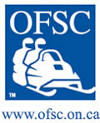LEARN RULES OF THE ROAD FOR SAFE SNOWMOBILINGOPP & OFSC Advise Snowmobilers to Know the Law and Get Trained (ORILLIA, ON) – The Ontario Provincial Police (OPP) and the Ontario Federation of Snowmobile Clubs (OFSC) remind snowmobilers that being compliant with the Motorized Snow Vehicles Act (MSVA) and being properly trained are key contributors to their safety, peace of mind and enjoyment while sledding this winter. Many of the laws governing motor vehicle drivers apply to snowmobile operators, such as failing to stop for police on the trail, speeding, not coming to a full and complete stop at a road crossing, and driving with a Blood Alcohol Concentration (BAC) that exceeds the legal limit. Failure to comply with the law carries penalties including fines, loss of driver’s licence, criminal charges and/or imprisonment. Charges incurred while snowmobiling go on your driving record and can impact both your ability to continue to drive and affordably insure an automobile. “A rider whose BAC is between 0.05 and 0.08 (known as the “Warn Range”) can be issued the same 3-day warning that suspends a driver’s licence on the road,” said OPP Sergeant Lise Grenier, Specialized Patrol Coordinator of the OPP Highway Safety Division. “This means that on the snow, the offending rider can no longer drive his/her sled to complete their ride.” More serious alcohol offences will result in licence suspensions that will prematurely end a rider’s snowmobiling season. Consequences also get tougher for repeat occurrences and riders are reminded that the Ontario Zero Tolerance law for drivers 21 and under also applies to snowmobiles. In addition, snowmobilers are reminded that both the driver and passenger must always wear a snowmobile helmet that meets the standards approved for motorcycle helmets, with the chinstrap securely fastened. Everyone who rides on a cutter, sled or similar device towed by a snowmobile must also wear a helmet. Did You Know? Riding a snowmobile is not permitted on 400-series highways and other high-speed expressways. Snowmobiles are also not allowed on the pavement of public roads where vehicles drive, on the ploughed portion of the shoulder or on public roads where prohibited by municipal law. To ride legally, snowmobile operators must always carry:
The OFSC and OPP also advise snowmobilers to get properly trained. The OFSC offers two courses approved by the Ministry of Transportation of Ontario (MTO): OFSC Driver Training is a 6-hour classroom style course for snowmobilers aged 12 years and older. The Right Way is an interactive version of Driver Training for adults. The OPP is committed to saving lives on Ontario’s highways, trails and waterways through the reduction of preventable injury and death. Initiatives are developed and delivered through the Provincial Traffic Safety Program. The OFSC is committed to proactive leadership in promoting safe, responsible riding, on and off Ontario snowmobile trails, by building safer snowmobiling knowledge, attitudes and behaviours through rider education, safety legislation development and enforcement. For more information, click on the following links: Snowmobile Safety in Ontario
OFSC: Lisa Stackhouse |
|
- HOME
- TRAILS & PERMITS
- CLUBSBonn TraeCalabogie & District Snowmobile ClubEganville Sno-DriftersGriffith-Matawatchan Sno-DustersHaliburton County Snowmobile AssociationKeetnaMaple Leaf Snow SkimmersMissing LinkNorth Renfrew Snowmobile AssociationOpeongo SnowbirdsPeterson PathfindersSnow Road Snowmobile ClubTimberlineWhitewater Sno-Goers
- NEWS
- EVENTS
- SAFETY
- PLANNING YOUR TRIP
- CONTACT


